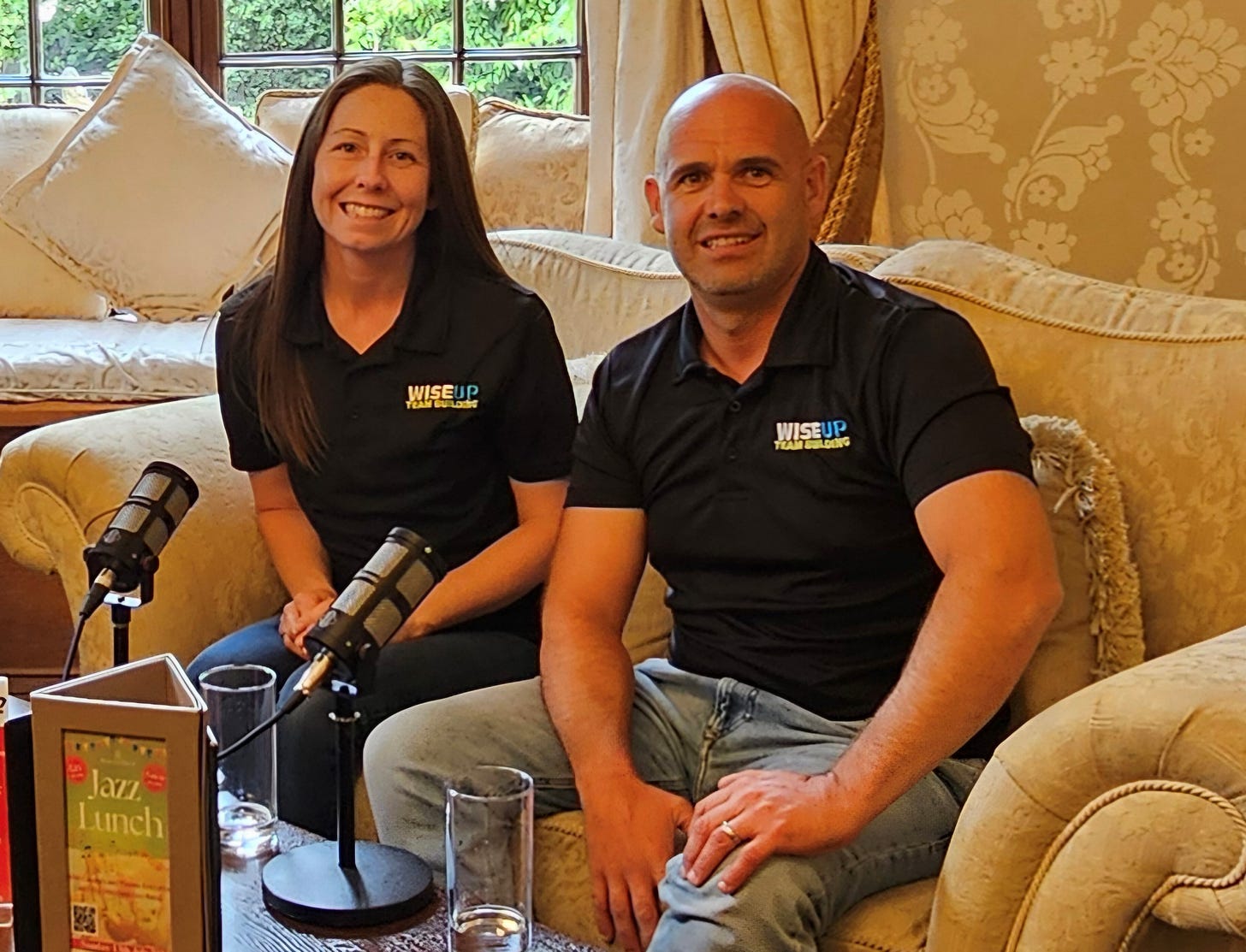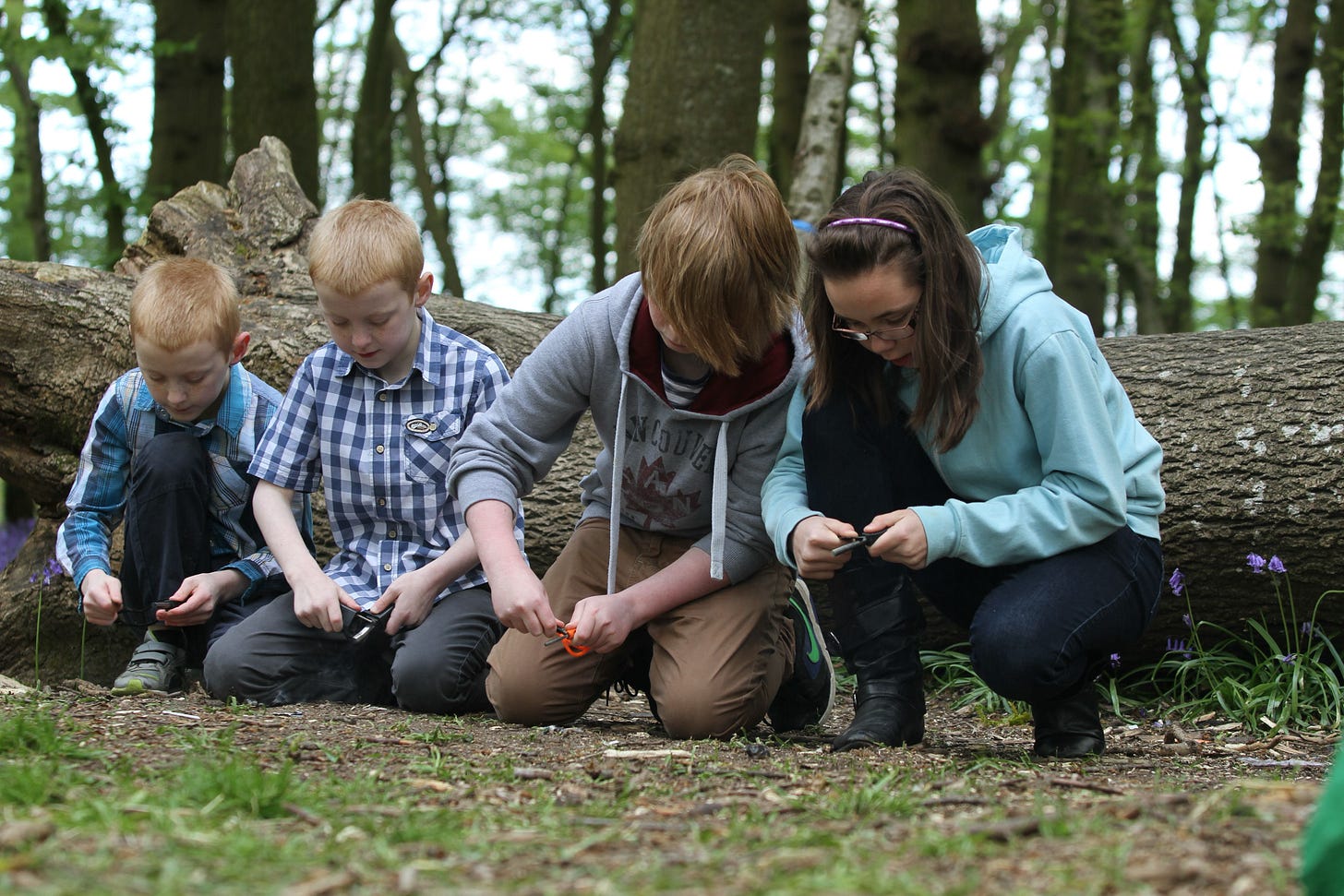“It lets people show where their truth strengths lie”
What we asked Richard and Alexandra Wise, husband and wife team behind outdoor education experts WiseUp
Richard and Alexandra Wise have been nominated for the King’s Award for their innovative work in outdoor education, with Alexandra also being a finalist for the Kent Businesswoman of the Year. Steven caught up with them to talk about how they came to work in outdoor education, how Richard can ruin Alexandra’s working day and how they came to stick magnets to their vans.
What is your official occupation?
Richard: I’m the founder and company director of WiseUp.
Alex: Co-Founder and Chief Operations Officer.
What is Wise Up?
Richard: We are a mobile outreach company that goes out to schools all across the UK and delivers high impact team building days that focus on soft skills like planning, communication, working together, whilst building resilience. These skills are very much lacking in today’s world, and schools focus on academic results. We go in and help support teachers and students to focus on those soft skills that are going to help them not only back in the classroom, but also later in life.
Alex: I think we’ve been in the outdoor industry working with activities like this for young people for many years. We have seen quite a big decline in the skills that young people have, mainly due to technology. There’s also been a considerable drop in schools being able to have the funding to access activities like what we do. We are really passionate about getting as many schools as possible to use us so that as many students as possible can develop that side of things and achieve potential in other ways that aren’t always measured in a school environment.
Sometimes they don’t even realise they’re learning anything. The feedback we get all the time is that teachers are blown away.
What does outdoor education involve?
Richard: We have a number of different activities, but the activities we run are just the vehicle for delivering the outcomes, from command tasks, team building, problem solving activities. We run bushcraft. We run five-day multi-activity programs where the students, rather than go offsite to a residential centre, they can bring us in. Most schools have great sites. They have fields, woods, playgrounds, tennis courts, all sorts of facilities. We go to them, which is our USP. We utilise their school site, set everything up, and we can do a five-day program where they would do team building on the Monday, bushcraft on the Tuesday, then we can do archery and an assault course, we do things like catapult building, we’ve got an apprentice themed day, which is an entrepreneurship day as well. We’ve got different activities, but for us, they’re just a vehicle to then deliver the outcomes. After every activity, we do debriefs with the students on ‘How well did you plan that activity?’ ‘Did you work together as a team?’ ‘Did you stay motivated throughout?’ ‘Was everybody involved?’ We pick it apart and have a look. After each activity, they get some feedback. Throughout the day or the course that we’re running, two days, three days, we see a massive improvement with their soft skills and teamwork skills.
Alex: I would say the premise, like all of our activities, is to get them outside, out of between the four walls, doing something different that they’re not doing day to day and really be able to see that, or I suppose apply some of the learning that they’re doing in school, but in very different ways and transfer those skills into practical problem solving and being able to put into action, communicating with other people, learning about other people’s differences. Doing that in a fun way. Sometimes they don’t even realise they’re learning anything. The feedback we get all the time is that teachers are blown away. They’ll be like, ‘In the classroom, he is a nightmare. He’s always being sent out, sent to the headteacher’s office. You know, we’ve struggled to engage him.’ Then he comes outside on one of our activities, and he’s at the fron,t and he’s leadin,g and he’s sharing great ideas, and the teachers are just blown away, and they actually then go back into the classroom, seeing that student from a completely different perspective.
Schools are geared up for academic results. It’s quite a dated education system.
When you can see those results and you see the effect it has and the value in it, why do you think that this sort of activity doesn’t happen just inherently in schools?
Richard: Because schools are geared up for academic results. It’s quite a dated education system. Everybody’s talking about it at the moment, how everything’s advancing in the world, technology, AI. The schools are still teaching old school things. Nowadays you can go onto a bit of software and get the result instantly. I think they’re massively overlooking the soft skills, and it really needs to be incorporated into the curriculum. I think there’s huge, huge gaps in the curriculum.
Alex: For schools, there’s a lot of pressure on them to achieve results, and it’s easier to measure whether somebody gets 10 out of 60 on a test or 50 than to be able to measure somebody and how good they are at empathy within a group situation, or how good they are at leading a team. It’s hard to put a number on that. The focus has been taken away from that overall person and is purely we need to get this person to pass these tests in order to look like they’re achieving what they’re setting out to do in a school.
Richard: The biggest problem with that is actually the workforce has moved on, but schools haven’t. Most companies nowadays do personality testing when they’re employed. They might come with a university degree, they might have all of the qualifications that they need to apply for that job, but if it comes down to ten people, they want the person that’s going to fit into their team best, who’s the best team player, who’s going to be fitting personality wise and what we want within our company, but they’re not. That’s not filtering through to the schools and it’s not being taught in the schools and these people are coming out of uni and couldn’t get employed even though they had a degree in what they were told they needed a degree in.
You also offer sessions for the corporate sector?
Richard: Yeah, we have that as a separate business so that they don’t get too confused. We have WiseUp Team Building, which is our schools company, and we have WiseUp Events, which is our corporate company. It’s very similar, focusing on the soft skills. For many years, there’s been corporate away days floating around where you can go clay pigeon shooting, chocolate making, all of these fun activities, which are brilliant fun. But no one’s really dived into the soft skills and linking that up. We use the activities to facilitate these really important talks on personalities and teamwork and whatever the corporate client wants to tailor it around. If they want a wellbeing day for their staff, we can create a wellbeing package that fits around, and we link up with venues like local hotels. Our corporate is very much Kent-based. We work with some of the top hotels in Kent, and they invite us in to work with their corporate clients.
Alex: I think all of it, between the schools and the corporate, is to let everybody see how, although people are all different, everybody has their strengths in different areas and how that can be, that’s really valuable within a team environment. Sometimes that’s forgotten because it is very much, ‘That’s your job and that’s what you do.’ But when you’re put into a completely different situation, it lets people show where their true strengths lie. Then it gives people the opportunity to see how that can be utilised in different ways, either in the school environment or in a workplace environment too.
Richard: We’re looking at ways to try and quantify it, because we’ve done it for years, we’re very passionate about it, and we know it works. The feedback we get day in, day out blows us away, and just seeing it on the day, the improvement in the students or in the corporate clients, but we are looking at a way to quantify it going forward because I think once you can do that, we have a lot more impact in what we’re doing. We’re doing studies into the impact of what we do.
How did WiseUp come about? Did you meet through outdoor activities?
Richard: A bit of background on me. I started sailing when I was eight. I remember standing at the edge of a reservoir looking out at my grandad, and he said, ‘Once you turn eight, you’re old enough to have a lesson. I’ll take you for a lesson.’ I started to sail. Then I started getting into quite competitive racing. I was in Team GB, sailing at a high level. When I was 16, I didn’t really thrive in school. I struggled to stay focused. I was definitely an outside person, loved the outdoor activities. When I turned 16, I did my sailing instructor qualification. That took me all around the world, teaching in Turkey and South Africa and all over. I was doing that and working for different outdoor centres. I got more qualifications. I became a windsurfing instructor, canoeing, kayaking, power boating, lots of water-based activities. I worked for some companies in the UK, some local council-run activity centres, and I’ve got lots of land qualifications, climbing, walking, archery, mountain biking, and all of those qualifications.
Later on in my career, I was running an outdoor centre for Kent County Council, which was Bluewater Outdoor Centre. I was the chief instructor there. Alex came down from Scotland, where she lived, for a job and never went back. We met each other and worked there for a bit, and then we’re hearing from the teachers all the time working there, ‘These a brilliant activity, great for the students, but we’re traveling out from London for two hours and two hours back, the coaches are getting really expensive.’ We thought, ‘Why is no one taking these activities into schools?’ Okay, we can’t pick the lake up and take it in, but a lot of the activities we were passionate about, they were more than able to be taken in.
Keep reading with a 7-day free trial
Subscribe to Kent Current to keep reading this post and get 7 days of free access to the full post archives.




